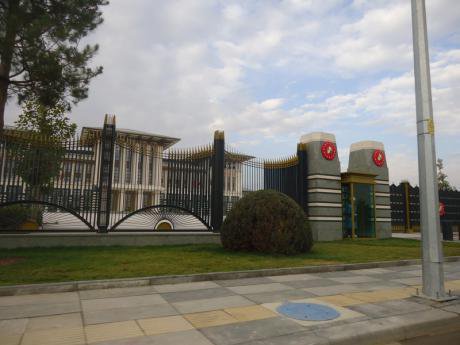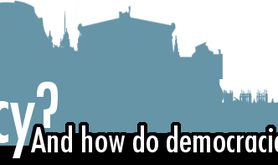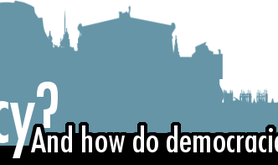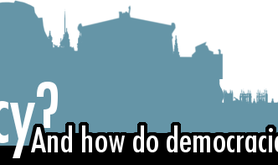

President Erdogan's palace. Demotix/ Nathan Morley. All rights reserved.Democracy in Turkey has not fared well under the current AKP (Justice and Development Party) government. Since coming to power in 2002, there has been a backsliding in democracy and the Turkish parliament has done little to prevent this. Initially, many greeted the AKP with enthusiasm: western democrats in particular. In its first years in power, the party reined in the inclinations of the military and the judiciary to arbitrarily intervene in political life. Restrictions on wearing the headscarf in public were lifted in the name of promoting freedom of expression. More liberal policies were pursued towards the Kurdish population, to the point of negotiating with the PKK.
Creeping authoritarianism
Yet with hindsight, and after 14 years of AKP rule (12 of them under the premiership of Recep Tayyip Erdogan), these policies actually look like the beginnings of democratic backsliding. Reining in the military and judiciary has allowed the AKP to assert its power free of checks and balances. The result is an intermeshing of the state and the party. A creeping, moderate Islamisation of public social life is evident. Media interference and persecution of those who criticise the government is common. Most recently, confrontational policies with Kurdish communities and the PKK have resumed.
In theory the Turkish political system should be one that disperses power among multiple groups, preventing any one group from dominating it and encouraging consensus-building. It has a proportional electoral system and a history of coalition governments; there is an independent judiciary with a written constitution that is difficult to change; and there is scope for direct public involvement in decision-making through referendums.
Yet, in reality, the Turkish system under the AKP is highly majoritarian, with power concentrated in the hands of a small coterie of elites. This is achieved not in the way that a country like Britain is highly majoritarian (through the use of first past the post, no written constitution and the principle of parliamentary sovereignty), but it is the product of the weakness of institutions that can check the government.
Erdogan, throughout his time as leader of the AKP, has relished the concentration of power in himself and his party. He justifies this in the way a typical majoritarian leader would do, asserting that the backing of a plurality of the voters should allow his party to do what it wishes.
The best example of AKP majoritarianism is seen in its attitude to the Gezi Park protests in 2013. Following the heavy-handed clampdown on protestors, Erdogan defended his response with reference to his electoral mandate, citing the 49 percent of the vote share won in the 2011 election. He undermined the protestors by labelling them a small minority that are not representative of Turkish opinion and he threatened them with the 50 percent of the population that were awaiting his orders to smash the protests.
The HDP – a party for all?
Amidst this background, the HDP (Peoples’ Democratic Party) emerged as an alternative that could promote Turkish democracy and serve as a bulwark against the AKP’s totalitarian tendencies.
Where Erdogan saw the Gezi protests as an opportunity to assert his majoritarian authority, the HDP leadership under Selahattin Demirtas, saw it as an opportunity to build an alliance with groups dissatisfied with the state. Given that the Gezi Park protestors were a highly heterogeneous group, including students, liberal professionals, LGBT groups, anti-capitalist Islamists, Kurdish groups, socialists and secularists, the HDP sought to be considered as their vanguard.
Although primarily a Kurdish nationalist party, its leadership positioned the party as a wider vehicle that was concerned with minority rights, egalitarianism and democracy. This happened to include Kurdish rights at the forefront of the party’s goals, but it also extended to other minority groups. As such, the HDP today is another example of the reinvention of minority nationalist movements as rights-based groups who demand self-determination to help realise democracy.
The elections of June 2015 saw these two different visions of democracy come into competition. The HDP faced a number of challenges during this campaign. Most notably, this was the first time since 2002 that a Kurdish party entered the elections as a party rather than as a collection of independent candidates. Turkey’s high electoral threshold means that parties must secure at least 10 percent of the vote nationally in order to gain any seats in parliament, regardless of how well they do in individual constituencies. Although this law was introduced in order to limit possible instability associated with multiparty coalition governments, it had the additional consequence of preventing Kurdish party representation given that such parties have only historically performed well in the Southeast and parts of the East of the country.
Yet, emboldened by their performance in the 2014 presidential election where Demirtas secured 9.8 percent of the national vote, the HDP entered the electoral fray. It proved to be an inspired decision as the HDP outperformed expectations. They secured just over 13 percent of the national vote share, gaining 80 out of 550 seats in parliament.
Running as a party helped to boost their vote share in core Kurdish constituencies compared to previous elections where candidates ran as independents. Additionally, repositioning the HDP as a group with wider appeal seemed to make some limited headway. The party secured the highest ever vote share of a Kurdish party in major cities outside the southeast (for example in Istanbul they secured 12.6 percent of the vote compared to 5.5 percent for the last Kurdish party to run in an election in 2002, DEHAP; 5.6 percent compared to 2.4 in 2002 in Ankara; and 10.5 percent compared to 5.2 in 2002 in Izmir). Votes won came at the expense of the AKP mostly, who also lost votes on their right flank to the right-wing Turkish nationalist party, the MHP (Nationalist Movement Party). Indeed for the first time since 2002, the AKP did not have enough seats to form a single-party majority government (they secured 46.9% of the seats).
A cold reality check
So did the rise of the HDP with their new democratic positioning help to democratise Turkey’s parliament and reverse the backsliding seen under the AKP?
The short answer is no, nor does this look likely any time soon. Undoubtedly the democratic representativeness of the July 2015 parliament increased compared to any previous parliaments. The ‘deviation from proportionality score’, which compares the difference between who people voted for and who actually won seats in parliament, was at its lowest since the AKP came to power. It scored 7.5, which basically means 7.5 percent of members of parliament were not entitled to be there on the basis of their national vote share. This compared to a score of 45.3 in 2002, 12.7 in 2007 and 10.2 in 2011. Another commonly used proxy measure of the representativeness of parliament is the percentage of women elected, and this reached its highest ever level in June 2015 at 17.7 of female parliamentarians (it was 4.4% in 2002, 9% in 2007, and 14% in 2011).
But why was there no real change? Well the AKP responded as you would expect an authoritarian and majoritarian party in control of the state to do so. They refused to form a coalition government and instead engaged in a programme of what is known as ‘preference shaping’, whereby political parties try to define what are the most pressing issues facing a country while also positioning themselves as the solution to these issues.
Erdogan, knowing that his party needed to win back votes from his right flank and that he needed to drive down support for the HDP, argued that strong leadership was needed for the country and that the political instability of an indecisive electoral outcome risked pushing the country into chaos. Alongside this, harassment of HDP supporters and members increased as did media suppression.
Additionally Erdogan has long held the ambition to convert the Turkish parliament into a presidential system. Where he previously hoped to persuade the HDP to help him achieve this in return for concessions to Kurds, poor relations between the parties and electoral competition meant this was not forthcoming. Yet after June 2015, realising this ambition became all the more urgent for Erdogan. A presidential system, with its winner-takes-all outcome and the weakness of non-executive institutions in Turkey would in effect boost Erdogan’s control over the system rather than checking it. Once again, Erdogan’s response was to attempt change the ruling institutions to shore up his power rather than seeking consensus with other groups in Turkey.
Therefore the outcome of the June 2015 election was an AKP caretaker government until it was possible to declare new elections to be held in November 2015. The November election results were mixed for the democratic credentials of the Turkish parliament. Erdogan’s populist appeals worked and an AKP single party government was returned, recouping the votes it had lost to the MHP and some of the voters it had lost in the Kurdish populated areas of eastern and southeastern Turkey. HDP support fell to 10.8 percent, but crucially remained above the 10 percent threshold and so returned 59 seats.
So with a few months hindsight, what can be said about the rise of the HDP and the state of Turkish parliamentary democracy? Given the democratic backsliding trend already in place under the AKP, the rise of the HDP as a small but significant rival actually resulted in increased polarisation and an entrenchment of majoritarian rule.
This just serves to highlight the pessimistic state of Turkish democracy today. What is more, it should certainly not be assumed that the HDP are the great democratic hope of Turkish politics. The HDP and its members are said to be sympathetic towards the PKK, who have returned to their campaign of violence. Additionally, the HDP and Kurdish nationalism has its own majoritarian streak, believing that as Kurds are the majority in certain parts of the country, these should come under decentralised (presumably Kurdish) rule whilst remaining under Turkish sovereignty. As such, there is no sign of a more consensual style of democratic politics anywhere in sight.
This article is published in association with the Westminster Foundation for Democracy, which is seeking to contribute to public knowledge about effective democracy-strengthening by leading a discussion on openDemocracy about what approaches work best. Views expressed herein do not necessarily reflect those of WFD. WFD’s programmes bring together parliamentary and political party expertise to help developing countries and countries transitioning to democracy.



Comments
We encourage anyone to comment, please consult the oD commenting guidelines if you have any questions.